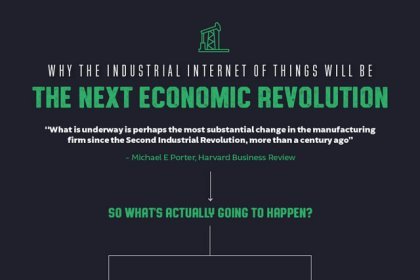The Industrial Internet of Things (IIoT) holds great potential to change the industrial sector and improve economic productivity by adding trillions of dollars to the global economy.
The development of the Internet of Things has completely changed the physical world, making it safer and more convenient. The IoT is a wireless network of objects embedded with sensors to interact with each other. According to Gartner, the amount of connected devices will be about 26 billion in 2020, a 30-fold increase from 2009.
The technology is being widely applied by different organizations, including those from medical, automotive and transportation industries. With the adoption of the IoT companies will be able to effectively control their assets and reduce energy costs.
The technological developments we observe today are expected to lead to a new industrial revolution, say McKinsey’s analysts Andreas Tschiesner and Markus Löffler. The IoT system is forecasted to drive major changes, called by some industry members as the fourth industrial revolution.
As shown in the infographic by RS-online, the industrial internet revolution is predicted to bring trillions of dollars to the global economy by 2030. It will contribute to the world economy more than such major countries, as Canada, UK, Germany and Japan.
Like the previous industrial revolutions, it will boost economic productivity, what will result in higher incomes and living standards. By 2030, the IIoT is forecasted to raise the average income in the US by 20-30%. According to high estimates, GDP per capita in the country will reach $86,500 in 2030. For instance, GDP per capita in 2014 totaled $54,630.
The industrial segment will significantly benefit from the integration of the technology. With the adoption of the IoT, factories will be able to easily connect with a wide range of other factories across different regions.
The new system will allow plants to save funds and increase productivity by automating the manufacturing process. Moreover, it will increase the safety at workplaces where dangerous situations often occur. By using smart devices, manufacturers will be able to manage such data, as processing, personnel data, weather and temperature conditions.
As Löffler noted, we will likely see a consolidation of devices and process management, what means machines and work flows will integrate into a single entity. “The work flow ceases to exist as an independent logistical layer; it is integrated into the hardware,” he said.
In order to build a stable system, factories will need to handle huge amounts of data and design robust algorithms. Moreover, the amount of data will continue growing, as new sensors are being integrated by facilities all over the world. Meantime, the lack of talented analysts and mathematicians significantly raises the competition in the labor market.
According to Robert Bosch’s executive, Siegfried Dais, it is important to analyze the potential of changes and their value, as well as estimate the savings these developments can provide. Besides, it is necessary to make the system user-friendly so that people can easily exploit the benefits it offers.
Given the ongoing developments, the technology will completely transform the manufacturing sector. However, it will take time to happen, as the IIoT is still in its early stages.
